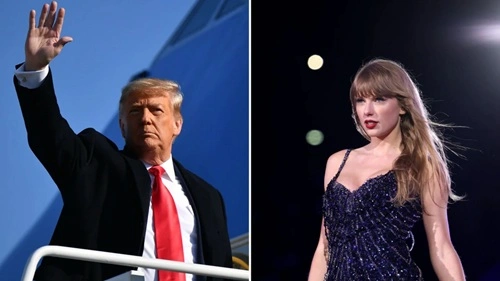There are rumors going around that Swift has sued Donald Trump, but legal experts say she might have file a case against him.
There are rumors going around online that pop star Taylor Swift is suing President Donald Trump because of false pictures that show her supporting his candidacy for president in 2024. But are these statements true?
Taylor Swift has not yet taken any legal action against Donald Trump. But the issue over the AI-generated pictures he released has started a bigger legal battle, and Swift’s lawyers are probably keeping a careful eye on these things.

The post that went viral and started it all
Trump shared AI-made pictures of Taylor Swift on his social media site, Truth Social, in August 2024. One picture that got a lot of attention showed Swift dressed in patriotic clothes with the words “Taylor Swift Wants You to Vote for Donald Trump” next to it. The description of the picture, “I accept,” made it seem like the artist was supporting his campaign, which is not true at all and completely misleading everyone.
Trump has never been endorsed by Swift. In fact, she has been upfront about how much she disagrees with his beliefs in the past and has lately backed Kamala Harris, a Democratic presidential candidate.
Legal Reasons: Could Swift Sue?
Legal experts agree that Swift might still take legal action under a number of various systems of law, even though no complaint has been filed yet:
- Right of Publicity: The right of publicity principle protects businesses from using a celebrity’s name, picture, or likeness without permission. People might think that Trump’s post broke this right.
- False Endorsement (Lanham Act): This federal regulation makes it illegal to use someone’s likeness in a way that makes it look like they support or are affiliated with something when they don’t. Swift’s lawyers can say that the AI image lies about her political views to trick voters.
- AI and Deepfake Laws: Some states, including Tennessee, have created laws to stop people from using AI-generated representations in bad ways, especially in politics and business. Swift might utilize these new rules to make a case against Donald Trump.
Even with these options, it’s not so easy to decide to suit.
Legal Problems Swift Might Have to Deal With
There are a lot of problems with suing a politician, especially one as well-known as Donald J. Trump.
- First Amendment Protections: In the U.S., political speech including satire and parody, is very well protected. Trump may say that his article is political commentary instead of a sincere assertion of support.
- Proving Damages: Swift would have to show that the tweet hurt her reputation or caused her to lose money, which would be hard because she has a lot of fans and is publicly against Trump.
- Proving the purpose: To win a false endorsement claim, Swift must show that the image was made to trick people and not just as a joke or meme.
Swift Speaks Out Publicly
Taylor Swift didn’t file a lawsuit, but she did speak out against the issue in September 2024 when she publicly supported Kamala Harris. In her pitch, she spoke out against the propagation of false information and stressed how important it is to vote based on facts, not false information.
A lot of people think she made the statement on purpose to remove it, from up any confusion without getting into a legal fight against Donald J. Trump.
What’s Next?
Swift is not suing Donald J. Trump at this time, although she might yet do so. She might send a cease-and-desist letter, ask for the content to be taken down, or just let her public declaration speak for itself.
This controversy has made people even more worried about the use of AI Tools in political propaganda. Experts say that deepfakes and synthetic media could be used more and more in order to influence public opinion, especially in elections where a lot is at risk.
The Conclusion:
No, Taylor Swift is not going to suing Donald J. Trump, at least not yet. But this case shows how unclear the law is when it comes to AI Generated content, celebrity image rights, and political communication. It’s not clear yet if Swift will take the issue to court or not, but the case has already triggered a lot of serious debate about digital ethics and false information in the age of AI.